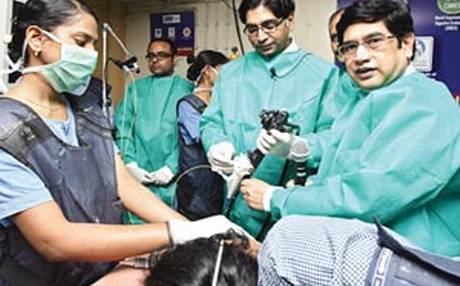Workshop on Spy Glass held in Chennai
CHENNAI: A novel instrument for the easy detection of pancreatic and bile duct diseases was demonstrated at the MedIndia Hospital here on Wednesday.
The Spy Glass scope will aid doctors in the direct examination of the pancreas and the bile duct. So far the only way to check them was through indirect methods like CT scans. With the Spy Glass scope, stones and blocks in the bile duct and pancreas can be fragmented using lasers, and biopsies can be done.
Dr T S Chandrasekar, chairman and chief internal gastroenterologist at MedIndia, says, “Previously, surgery was required to remove large stones. Now with the help of the laser in the spy glass, we can fragment the stones easily. Any blockage can be taken out by the probes to find out if they are cancerous or not without having to open up the patient.”
The Spy Glass scope goes in through the mouth as part of a regular endoscope. Dr Chandrasekar says, “The regular one is like a mother scope with the Spy Glass as a ‘baby’ scope. The mother scope stops at the intestine, and the Spy Glass enters the pancreatic duct, from where it can be directed through the ducts.”
Produced by an American company, the Spy Glass will reduce surgery and make diagnosis easy for both patients and doctors. Dr Sandeep Patel, an expert in the field, demonstrated the technique to more than 40 gastroenterologists.
A biopsy using the Spy Glass will cost up to `20,000. The procedure for breaking stones in the bile duct and pancreas usually costs Rs 50,000 to `1 lakh. With the newer technique, the cost is halved, said Dr Chandrasekar.




